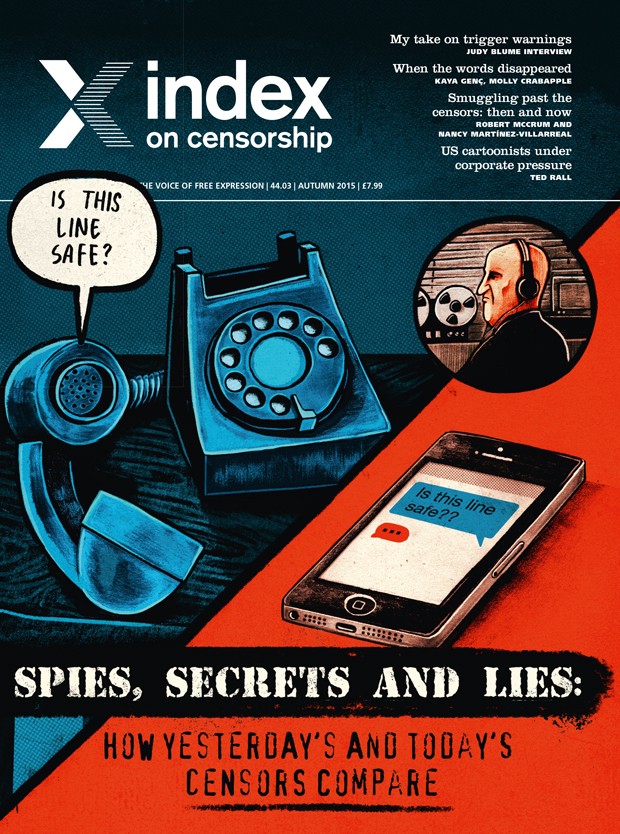16 Dec 2015 | Awards, Events, mobile, Press Releases
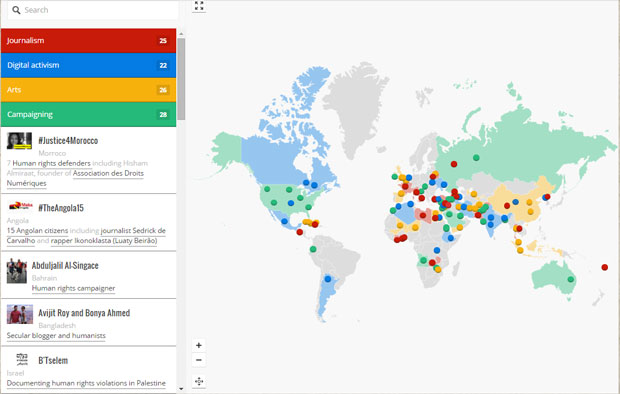
A graffiti artist who paints murals in war-torn Yemen, a jailed Bahraini academic and the Ethiopia’s Zone 9 bloggers are among those honoured in this year’s #Index100 list of global free expression heroes.
Selected from public nominations from around the world, the #Index100 highlights champions against censorship and those who fight for free expression against the odds in the fields of arts, journalism, activism and technology and whose work had a marked impact in 2015.
Those on the long list include Chinese human rights lawyer Pu Zhiqiang, Angolan journalist Sedrick de Carvalho, website Raqqa is Being Slaughtered Silently and refugee arts venue Good Chance Calais. The #Index100 includes nominees from 53 countries ranging from Azerbaijan to China to El Salvador and Zambia, and who were selected from around 500 public nominations.
“The individuals and organisations listed in the #Index100 demonstrate courage, creativity and determination in tackling threats to censorship in every corner of globe. They are a testament to the universal value of free expression. Without their efforts in the face of huge obstacles, often under violent harassment, the world would be a darker place,” Index on Censorship CEO Jodie Ginsberg said.
Those in the #Index100 form the long list for the Index on Censorship Freedom of Expression Awards to be presented in April. Now in their 16th year, the awards recognise artists, journalists and campaigners who have had a marked impact in tackling censorship, or in defending free expression, in the past year. Previous winners include Nobel Peace Prize winner Malala Yousafzai, Argentina-born conductor Daniel Barenboim and Syrian cartoonist Ali Ferzat.
A shortlist will be announced in January 2016 and winners then selected by an international panel of judges. This year’s judges include Nobel Prize winning author Wole Soyinka, classical pianist James Rhodes and award-winning journalist María Teresa Ronderos. Other judges include Bahraini human rights activist Nabeel Rajab, tech “queen of startups” Bindi Karia and human rights lawyer Kirsty Brimelow QC.
The winners will be announced on 13 April at a gala ceremony at London’s Unicorn Theatre.
The awards are distinctive in attempting to identify individuals whose work might be little acknowledged outside their own communities. Judges place particular emphasis on the impact that the awards and the Index fellowship can have on winners in enhancing their security, magnifying the impact of their work or increasing their sustainability. Winners become Index on Censorship Freedom of Expression Awards Fellows and are given support for the year after their fellowship on one aspect of their work.
“The award ceremony was aired by all community radios in northern Kenya and reached many people. I am happy because it will give women courage to stand up for their rights,” said 2015’s winner of the Index campaigning award, Amran Abdundi, a women’s rights activist working on the treacherous border between Somalia and Kenya.
Each member of the long list is shown on an interactive map on the Index website where people can find out more about their work. This is the first time Index has published the long list for the awards.
For more information on the #Index100, please contact [email protected] or call 0207 260 2665.
2 Dec 2015 | Magazine, mobile, Volume 44.04 Winter 2015
[vc_row][vc_column][vc_custom_heading text=”What can’t people talk about? The latest magazine looks at taboos around the world”][vc_row_inner][vc_column_inner width=”1/2″][vc_column_text]
What’s taboo today? It might depend where you live, your culture, your religion, or who you’re talking to. The latest issue of Index on Censorship magazine explores worldwide taboos in all their guises, and why they matter. Comedians Shazia Mirza and David Baddiel look at tackling tricky subjects for laughs; Alastair Campbell explains why we can’t be silent on mental health; and Saudi Arabia’s first female feature-film director Haifaa Al Mansour speaks out on breaking boundaries with conservative audiences.
[/vc_column_text][/vc_column_inner][vc_column_inner width=”1/2″][vc_empty_space height=”60px”][vc_single_image image=”71995″ img_size=”full”][/vc_column_inner][/vc_row_inner][vc_column_text]
Plus a crackdown on porn and showing your cleavage in China; growing up in Germany with the ghosts of WW2; what you can and can’t say in Israel and Palestine; and the argument for not editing racism out of old films. As the anniversary of Charlie Hebdo murders approaches, we also have a special section of cartoonists from around the world who have drawn taboos from their homelands – from nudity, atheism and death to domestic violence and necrophilia.
Also in this issue, Mark Frary explores the secret algorithms controlling the news we see, Natasha Joseph interviews the Swaziland editor who took on the king and ended up in prison, and Duncan Tucker speaks to radio journalists who lost their jobs after investigating presidential property deals in Mexico.
And in our culture section, Chilean author Ariel Dorfman looks at the power of music as resistance in an exclusive short story, which is finally seeing the light after 50 years in the pipeline. We have fiction from young writers in Burma tackling changing rules in times of transition, and there’s newly translated poetry written from behind bars in Egypt, amid the continuing crackdown on peaceful protest.
Each magazine sale helps Index on Censorship fight for free expression worldwide. Order your copy here, or take out a digital subscription via Exact Editions (just £18 for the year).
[/vc_column_text][/vc_column][/vc_row][vc_row][vc_column][vc_custom_heading text=”SPECIAL REPORT: WHAT’S THE TABOO? ” css=”.vc_custom_1483453507335{margin-right: 0px !important;margin-left: 0px !important;border-bottom-width: 1px !important;padding-top: 15px !important;padding-bottom: 15px !important;border-bottom-color: #455560 !important;border-bottom-style: solid !important;}”][vc_column_text]
Why breaking down social barriers matters
Stand up to taboos – Shazia Mirza and David Baddiel on how comedy tackles the no-go subjects
The reel world – Nikki Baughan interviews female film directors Susanne Bier and Haifaa Al Mansour, from Denmark and Saudi Arabia
Not just hot air – Kaya Genç goes inside Turkey’s right-wing satire magazine Püff
Slam session – Péter Molnár speaks to fellow Hungarian slam poets about what they can and can’t say
Whereof we cannot speak – Regula Venske on growing up in Germany after WWII
China’s XXX factor – Jemimah Steinfeld investigates a crackdown on porn and cleavage
Pregnant, in danger and scared to speak – Nina Lakhani and Goretti Horgan on abortion laws and social stigma in El Salvador and Ireland
Airbrushing racism – Kunle Olulode explores the problems of erasing racist words from books and films
Why are we whispering? – Alastair Campbell on why discussing mental illness still makes some people uncomfortable
Shouting about sex (workers) – Ian Dunt looks at the debate where everyone wants to silence each other
The history man – Professor Mohammed Dajani Daoudi explains how he has no regrets, despite causing outrage after taking Palestinian students to Auschwitz
Provoking Putin – Oleg Kashin on how new laws are silencing Russians
Quiet zone: a global cartoon special – Featuring taboo-busting illustrations from Bonil, Dave Brown, Osama Eid Hajjaj, Fiestoforo, Ben Jennings, Khalil Rhaman, Martin Rowson, Brian John Spencer, Padrag Srbljanin, Toad and Vilma Vargas
[/vc_column_text][/vc_column][/vc_row][vc_row][vc_column][vc_custom_heading text=”IN FOCUS” css=”.vc_custom_1481731813613{margin-right: 0px !important;margin-left: 0px !important;border-bottom-width: 1px !important;padding-top: 15px !important;padding-bottom: 15px !important;border-bottom-color: #455560 !important;border-bottom-style: solid !important;}”][vc_column_text]
Reining in power – Natasha Joseph talks to the Swaziland editor who took on the king
Whose world are you watching? – Mark Frary explores the secret algorithms controlling the news we see
Bloggers behind bars – Ismail Einashe interviews Ethiopia’s Zone 9 bloggers
Mexican airwaves – Duncan Tucker speaks to radio journalists who were shut down after investigating presidential property deals
Head to head – Bassey Etim and Tom Slater debate whether website moderators are the new censors
Off the map – Irene Caselli on how some of the poorest people in Buenos Aires fought back against Argentina’s mainstream media
[/vc_column_text][/vc_column][/vc_row][vc_row][vc_column][vc_custom_heading text=”CULTURE” css=”.vc_custom_1481731777861{margin-right: 0px !important;margin-left: 0px !important;border-bottom-width: 1px !important;padding-top: 15px !important;padding-bottom: 15px !important;border-bottom-color: #455560 !important;border-bottom-style: solid !important;}”][vc_column_text]
The rocky road to transition – Ellen Wiles introduces new fiction by young Burmese writers Myay Hmone Lwin and Pandora
Sounds of solidarity – Chilean author Ariel Dorfman presents his short story on the power of music as resistance
Poetry from a prisoner – Omar Hazek shares his verses written in an Egyptian jail and translated by Elisabeth Jaquette
[/vc_column_text][/vc_column][/vc_row][vc_row][vc_column][vc_custom_heading text=”COLUMNS” css=”.vc_custom_1481732124093{margin-right: 0px !important;margin-left: 0px !important;border-bottom-width: 1px !important;padding-top: 15px !important;padding-bottom: 15px !important;border-bottom-color: #455560 !important;border-bottom-style: solid !important;}”][vc_column_text]
Global view – Index on Censorship’s CEO, Jodie Ginsberg, on the pull between extremism legislation, free speech and terrorism
Index around the world – Josie Timms presents Index’s latest work and events
[/vc_column_text][/vc_column][/vc_row][vc_row][vc_column][vc_custom_heading text=”END NOTE” css=”.vc_custom_1481880278935{margin-right: 0px !important;margin-left: 0px !important;border-bottom-width: 1px !important;padding-top: 15px !important;padding-bottom: 15px !important;border-bottom-color: #455560 !important;border-bottom-style: solid !important;}”][vc_column_text]
[/vc_column_text][/vc_column][/vc_row][vc_row][vc_column][vc_custom_heading text=”SUBSCRIBE” css=”.vc_custom_1481736449684{margin-right: 0px !important;margin-left: 0px !important;border-bottom-width: 1px !important;padding-bottom: 15px !important;border-bottom-color: #455560 !important;border-bottom-style: solid !important;}”][vc_column_text]Index on Censorship magazine was started in 1972 and remains the only global magazine dedicated to free expression. Past contributors include Samuel Beckett, Gabriel García Marquéz, Nadine Gordimer, Arthur Miller, Salman Rushdie, Margaret Atwood, and many more.[/vc_column_text][vc_row_inner][vc_column_inner width=”1/2″][vc_single_image image=”76572″ img_size=”full”][/vc_column_inner][vc_column_inner width=”1/2″][vc_column_text]In print or online. Order a print edition here or take out a digital subscription via Exact Editions.
Copies are also available at the BFI, the Serpentine Gallery, MagCulture, (London), News from Nowhere (Liverpool), Home (Manchester), Calton Books (Glasgow) and on Amazon. Each magazine sale helps Index on Censorship continue its fight for free expression worldwide.
 SUBSCRIBE NOW[/vc_column_text][/vc_column_inner][/vc_row_inner][/vc_column][/vc_row]
SUBSCRIBE NOW[/vc_column_text][/vc_column_inner][/vc_row_inner][/vc_column][/vc_row]
4 Nov 2015 | Artistic Freedom, Index Arts, Magazine, mobile, Music in Exile, Student Reading Lists
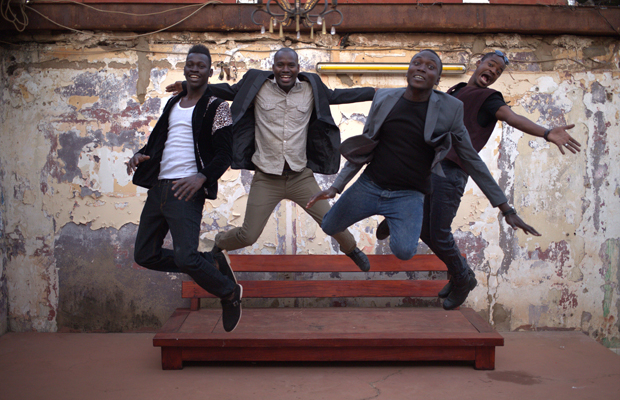
Songhoy Blues
To mark the launch of the Music In Exile Fund, Index on Censorship has compiled a reading list of articles that have appeared in the magazine since 1982 and deal with censorship and music. We are offering these articles — which are normally held behind a paywall — for free.
Index on Censorship launched the Music In Exile Fund in partnership with the producers of They Will Have To Kill Us First: Malian Music In Exile – a documentary that follows musicians in Mali after the 2012 jihadist takeover during which music was outlawed. One band’s story featuring heavily in the film is Songhoy Blues, who are just one of many to feature in the Music In Exile Fund playlist.
The fund will contribute towards Index on Censorship’s Freedom of Expression Awards Fellowship, a year-long programme to support those facing censorship.
You can donate to the Music In Exile Fund here.

From the Autumn 2010 issue of Index on Censorship magazine. Subscribe.
Banned: A rough guide
Marie Korpe and Ole Reitov have been tracking the music censors and the censored for more than a decade. They reflect on the tactics of modern censorship
When we founded Freemuse ten years ago, our aim was to defend freedom of expression for musicians and composers. Since then, we have documented music censorship in more than 100 countries. At first, we were not aware of the size of the problem, but the longer we have worked in the field, the larger the challenges become. Maybe we are still only seeing the tip of the iceberg. While more journalists have got music censorship on their radar and a number of musicians have benefited from our support, it is still rare to find records of music censorship and violations of musicians’ rights to freedom of expression in reports from Amnesty, Human Rights Watch and other global free expression watchdogs.
Read the full article
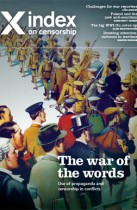
From the Spring 2014 issue of Index on Censorship magazine. Subscribe.
Change your tune?
Some homophobic lyrics in rap and reggae incite hatred and violence,
agree campaigners Peter Tatchell and Topher Campbell. But is
censorship the answer? First, Peter Tatchell explains why education will
help. Then Topher Campbell tells Alice Kirkland where he would draw
the line
Along with misogyny, homophobic lyrics have long blighted some rap and reggae music. Eminem and Buju Banton, among others, have found themselves in the firing line for their incendiary anti-gay hate music, ranging from rap songs containing insults like “faggot” to tracks that overtly glorify and encourage the murder of lesbian, gay, bisexual and transgender people.
Homophobic hate speech is wrong, regardless of whether it is expressed by a bully in the street or by a singer.
Read the full article
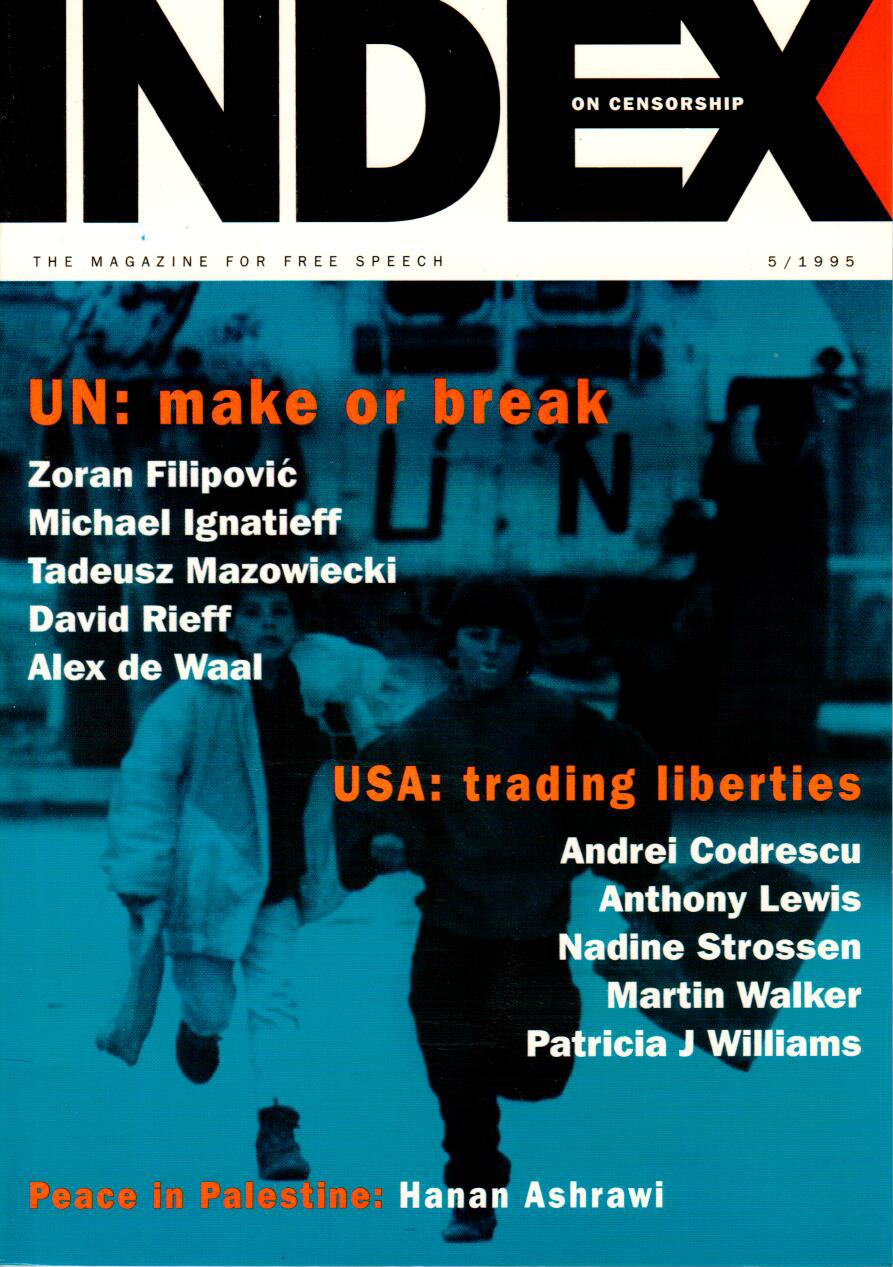
From the Autumn 1995 issue of Index on Censorship magazine. Subscribe.
To be young, alive and making music
Valrie Ceccherini writing in 1995 as part of a series focusing on the voices of those silenced by poverty, prejudice and exclusion
“My life has changed totally since the war,” says 20-year-old Ermin. He speaks of “the constant presence of death” with resignation. “I live shoulder to shoulder with death. Every time I go out, a missile could kill or wound me. Lots of my friends are dead. I think of them every day and 1 know 1 could join them at any moment. I’ve learned to live with this fear for three years now; there was no choice. I know it’s changed me. I’m harder, braver – or maybe I’ve just gone mad. Everybody here’s changed: everybody’s gone mad. You can’t help it after three years shut up in this hell.”
Emir is a slight youth of 17. “I used to spend most of my time away
from home, out with my friends. Now I scarcely ever leave home. It’s too dangerous.”
Read the full article

From the Autumn 2010 issue of Index on Censorship magazine. Subscribe.
Will Self on God Save The Queen
In the summer of 1977 I was 15 years old and wore an old tropical linen jacket I’d bought in a charity shop for a quid. It wasn’t so much off-white as ruinous, and it matched the colour of my shoes – winkle-pickers I’d painted myself using some kind of weird leather paint. Naturally I had to lie on my skinny rump to force my El Greco feet through the eight-inch ankles of my drainpipe jeans. Given all this sartorial mayhem it goes without saying that I absolutely concurred with the Sex Pistol’s front man, Johnny Rotten, when he sang, “God save the queen / The fascist regime”. Admittedly the causal connective “it’s” was lost in all the filth and the fury of his delivery, but we knew what he meant.
Actually, I can barely remember the circumstantial pomp that went into the celebration of the Queen’s Silver Jubilee, all I can recall is the Sex Pistols’ treasonable ditty, and the fact that it was banned from being played on the radio. At least I’m certain it was banned from the BBC’s Radio 1.
Read the full article
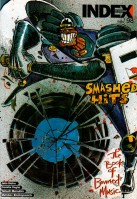
From the Winter 1998 issue of Index on Censorship magazine. Subscribe.
Tales of Terezín
Mark Ludwig for Index on Censorship on how the Nazis used music as a propaganda tool in the service of its doctrine of racial purity and superiority. Composers and musicians who did not fit the formula found themselves In the camps
In the 1920s, Weimar Germany was home to a rich and diverse mix of artistic and political movements. Composers stretched the boundaries of, and in some cases charted new courses for, classical music. Zeitmusik (music of the time), the 12 tone system and jazz were part of a new and excitingly diverse web of musical movements. As Hitler and the Nazi Party assumed control of Germany, the arts and the political climate were affected. Under the Nazi dictatorship, the arts – particularly music – were used as tools for indoctrinating and controlling the German nation with an ideology of national superiority, suppression and racial hatred.
Read the full article
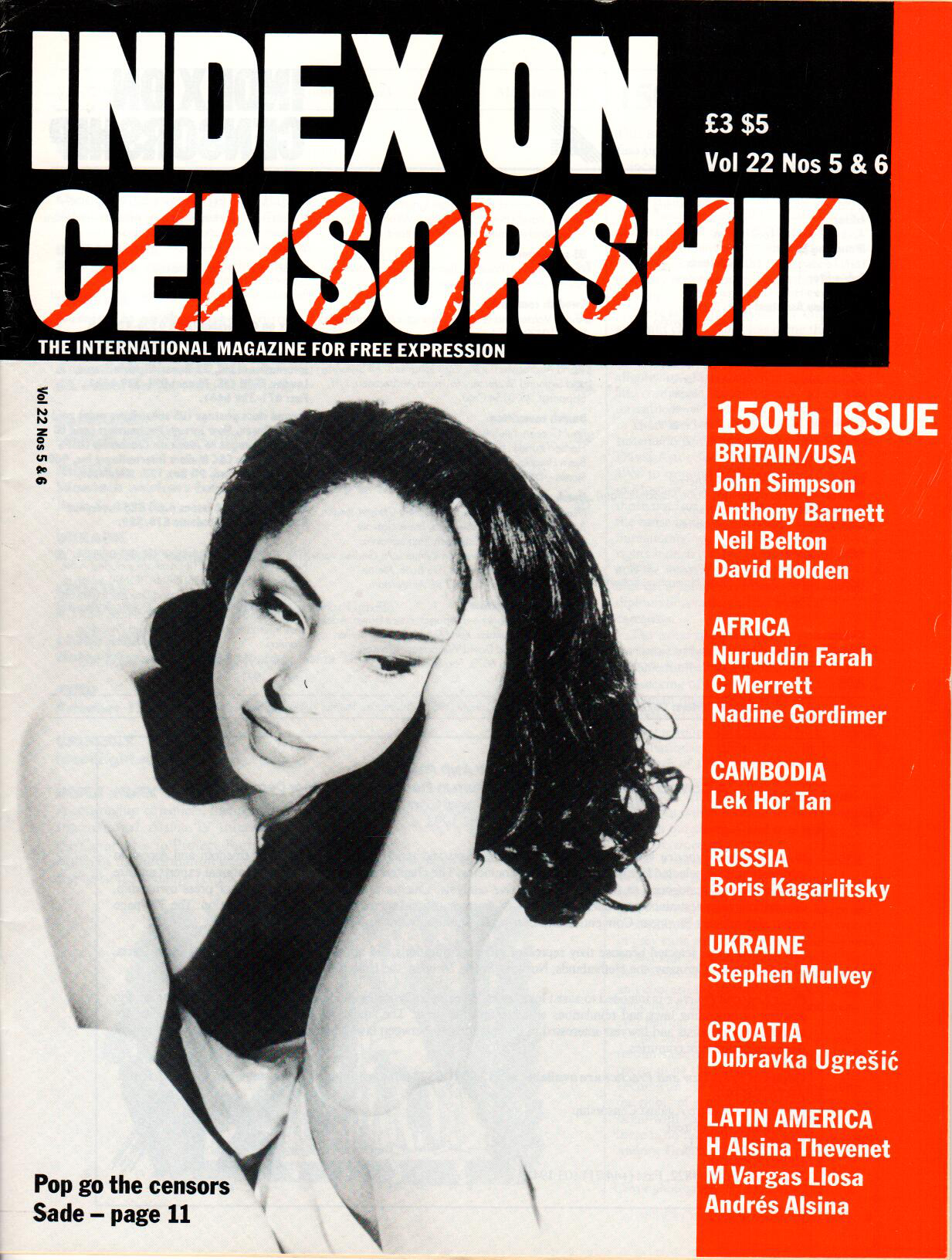
From the Spring 1993 issue of Index on Censorship magazine. Subscribe.
Pop go the censors
David Holden for Index on Censorship in 1993 on how anything — well almost — goes on the UK pop scene, but in the USA it’s a different story with Ice-T and the rappers sending shivers down parental spines
“Big boys bickering/fucking it up for everyone,” goes Paul McCartney’s 1992 song Big Boys Bickering. It’s an ecological song; the big boys bickering were the people at the Rio Earth Summit. About the song, McCartney has said: “When you talk about a hole in the ozone layer, you don’t talk about a flipping hole in the ozone layer, you talk about a fucking hole in the ozone layer. I know it might upset some of my fans, but I’m an artist, and I’m 50 years old and I think I can say what I like.”
Not on MTV America, Paul. According to the pop video channel, The Greatest Living Songwriter — faithful husband, caring parent, concerned citizen — is once again unsuitable for the youth of the USA.
Read the full article
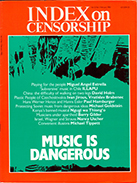
From the Winter 1983 issue of Index on Censorship magazine. Subscribe.
Banned in Bohemia
Vratislav Brabenec and Ivan Jirous tell the story of The Plastic People, a rock band which was seen as a threat by the Czech authorities during the Cold War
“Why should music be censorable?” asks Yehudi Menuhin on another page. Elsewhere in this issue the reader will see that in some parts of the world even certain musical instruments can be declared taboo by this or that military dictatorship. In Czechoslovakia since the early seventies it has been chiefly rock music that arouses the ire of the authorities – and those who insist on playing it find themselves not just banned but imprisoned.
Ah, but of course, one might say: if you set out to be a protest singer in a society ruled by a one-party dictatorship, what do you expect? The trouble with that line of argument is that The Plastic People of the Universe and the other rock groups with similarly strange names were not protest singers at all.
Read the full article
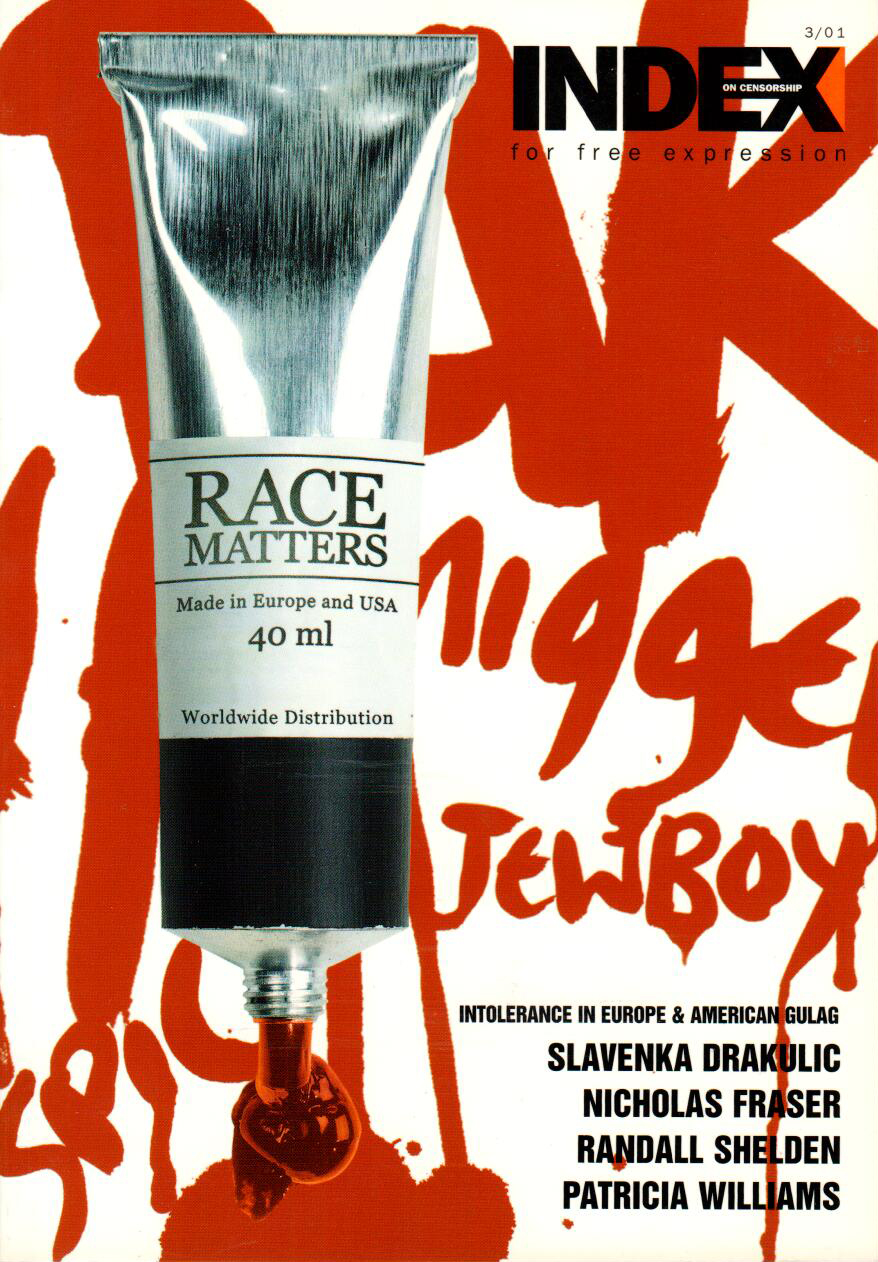
From the Summer 2001 issue of Index on Censorship magazine. Subscribe.
Music to hate with
Aided by the Internet, racist music has made inroads on European youth culture, says Heléne Löow
It was in the first half of the 1990s that White Noise music became the symbol of the growing racist subculture around Europe. Between 1990 and 1995, the music industry, then in a period of rapid expansion, gradually replaced the badly copied tapes, records that were hard to come by and roughly photocopied magazines with professionally produced CDs. The number of CDs on the market grew steadily; production became increasingly professional with Swedish White Noise record labels among the world’s most active producers.
By 1996, the first phase was over; for the next two years, production maintained its levels but there was no significant increase. By 1999, however, it was once more on the rise, along with white-power magazines, and other propaganda material.
Read the full article
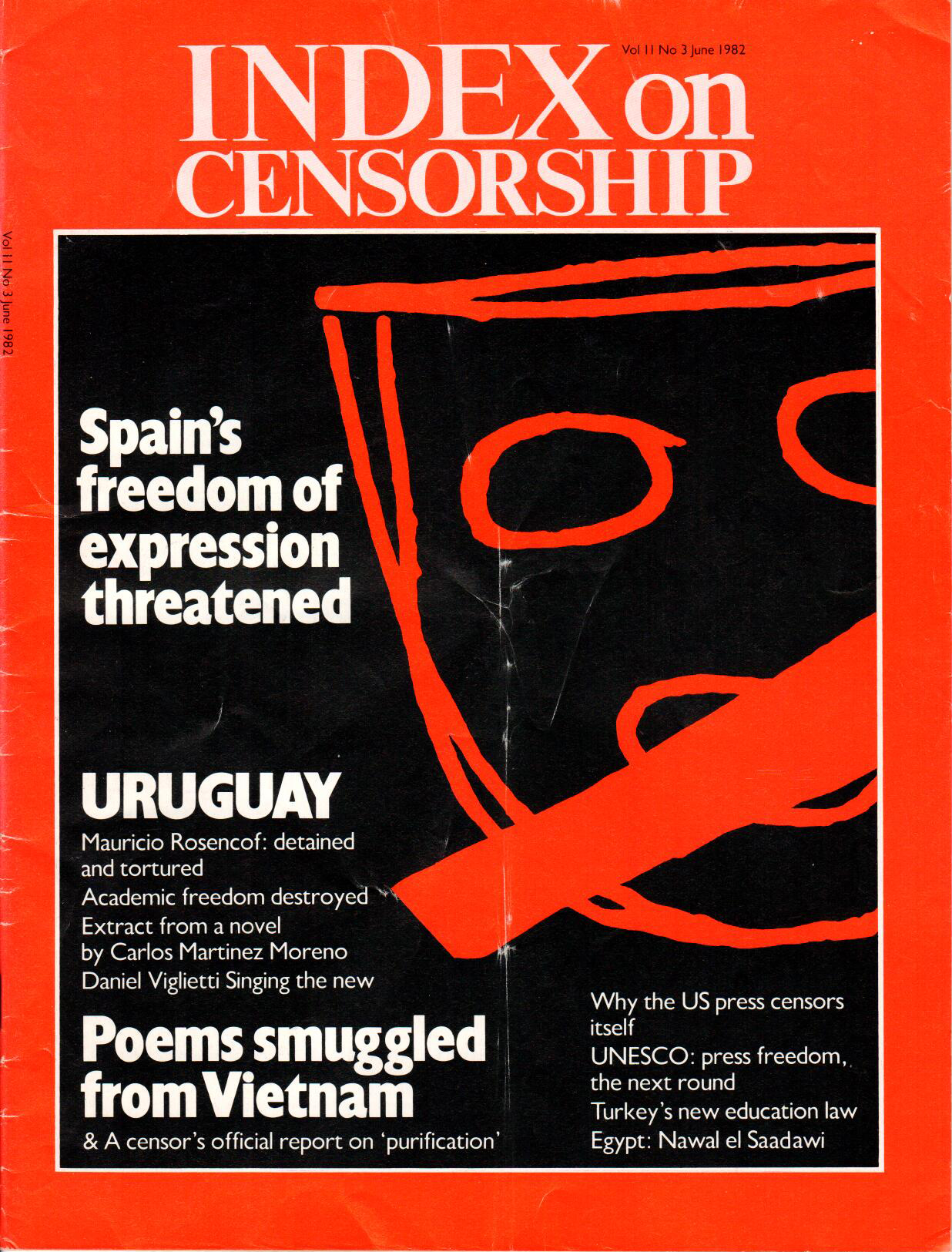
From the Summer 1982 issue of Index on Censorship magazine. Subscribe.
Singing the new
One of Uruguay’s best-known singers talks to Daniel Viglietti about his life in exile
I was first invited to this conference to participate, together with the Uruguayan writer Eduardo Galeano, in an event in which song and literature would work together, bringing together a man like Galeano, who writes with a pen, with someone like me, who, if you would allow me, writes with a guitar. Later on, the organisers phoned me to ask if I would add some thoughts about exile. I agreed to that, since I have been living in that situation now for eight years and one month. Given the nature of this occasion, I have attended some meetings handicapped by the fact that I do not speak English. For this kind of contribution, I need my mother tongue, Spanish. Today I have the advantage of a translation so I am going to throw out some ideas about the exile in which hundreds of thousands of Uruguayans have been living for eight, nine or even 10 years.
Read the full article
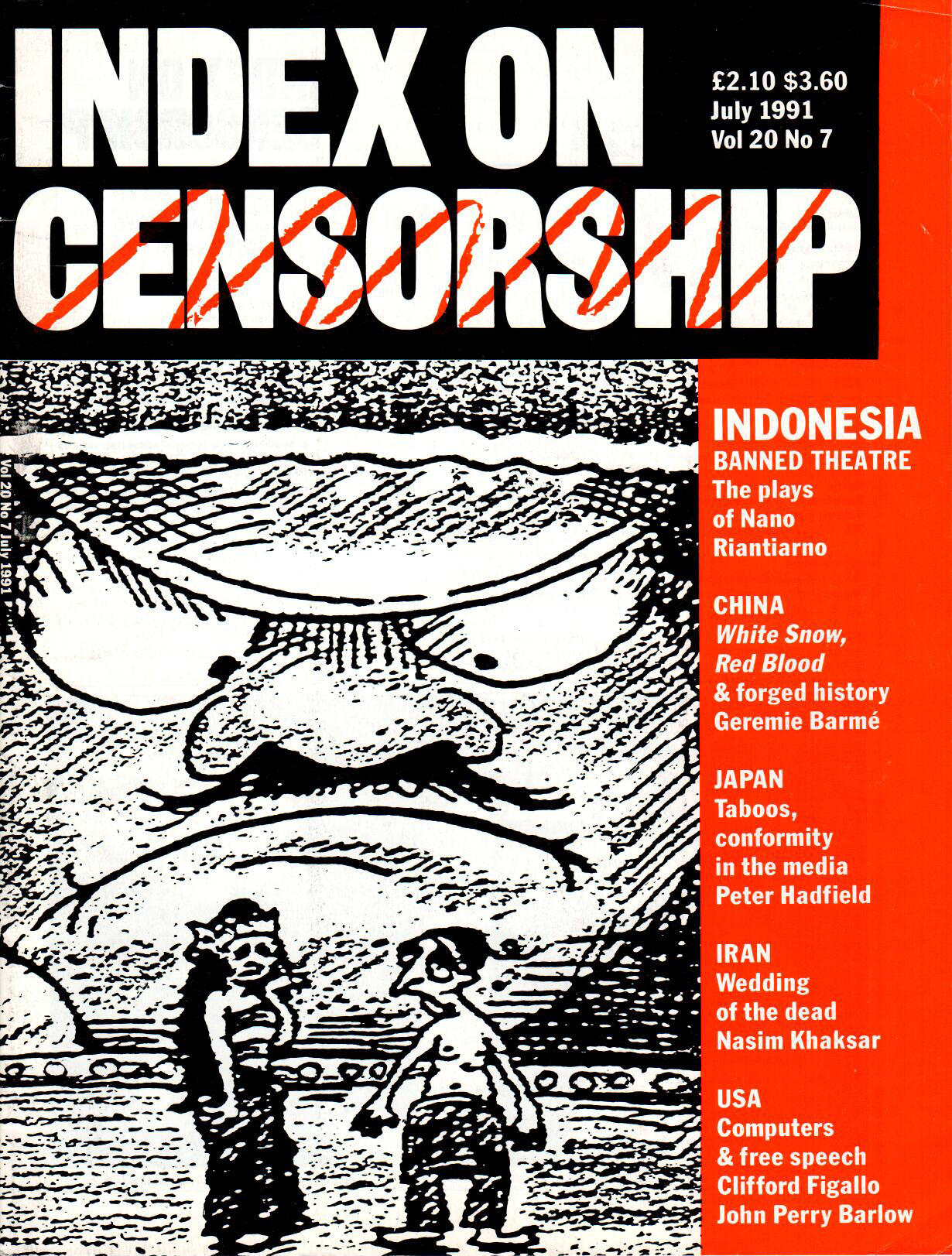
From the Summer 1991 issue of Index on Censorship magazine. Subscribe.
Chile: Cleansing the past
Nick Caistor on the Report of the Commission for Truth and Reconciliation, which revealed for the first time the details of how Chilean musician Victor Jara died
Victor Jara was one of the best-known singers and theatre directors during Salvador Allende’s Popular Unity government in Chile. From 1970 to 1973, Jara sang for the people and put on shows in shanty towns and factories, determined that popular culture should be at the heart of the government’s efforts to take Chile along its ‘path to Socialism’.
Shortly after the military coup led by General Augusto Pinochet on 11 September 1973, Victor Jara was taken prisoner. With hundreds of other suspects, he was held in the Chile stadium in the capital, Santiago. He was last seen alive as he was being transferred from there to the National Stadium on 15 September 1973.
Read the full article
13 Oct 2015 | Events, mobile

Structured around and spurred on by the spirit of interrogation, Question Everything is an unconventional, unwieldy and disruptive day of talks, art and ideas featuring a broad range of speakers drawn from popular culture, the arts and academia.
Are we in a drought of new options? Start imagining the world anew with a series of dissident provocateurs asking challenging questions and interrogating the opinions we trust, the systems which govern us and the things we take for granted.
Dissent encouraged. Be prepared not to agree.
With dissenters including:
• Brett Scott (author of The Heretic’s Guide to Global Finance).
• Ellen Quigley (University of Cambridge Ethical Investment Working Group).
• Francesca Martinez (comedian).
• Gary Anderson & Lena Simic (artists, The Institute for the Art and Practice of Dissent at Home)
• Hamid Ismailov (Uzbek journalist and writer).
• Heydon Prowse (satirist, The Revolution Will Be Televised)
• Mel Evans (author of Artwash: Big Oil and The Arts, activist Platform London & Liberate Tate).
• Noemi Lakmaier (artist).
• Peter Tatchell (activist).
• Tassos Stevens (artist, Coney).
• Priyamvada Gopal (Faculty of English, Cambridge).
• Thomas Jeffrey Miley (Department of Sociology, Cambridge).
Compered by Jodie Ginsberg, CEO of Index on Censorship.
When: Sunday 25 October, 1:00pm – 6:00pm
Where: Cambridge Junction, Clifton Way, CB1 7GX (Map)
Tickets: £5 from Cambridge Junction
Question Everything is a highlight of the Cambridge Festival of Ideas 2015, which has the theme of ‘power and resistance’. This event is a co-production by Index on Censorship, the Junction Cambridge and Cambridge Festival of Ideas.












